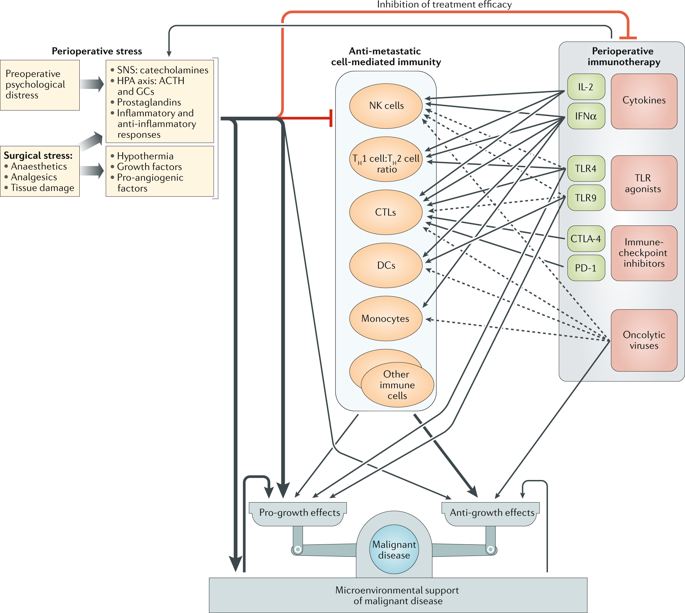当前位置:
X-MOL 学术
›
Nat. Rev. Clin. Oncol.
›
论文详情
Our official English website, www.x-mol.net, welcomes your
feedback! (Note: you will need to create a separate account there.)
Harnessing cancer immunotherapy during the unexploited immediate perioperative period.
Nature Reviews Clinical Oncology ( IF 81.1 ) Pub Date : 2020-02-17 , DOI: 10.1038/s41571-019-0319-9 Pini Matzner 1 , Elad Sandbank 1 , Elad Neeman 2 , Oded Zmora 3 , Vijaya Gottumukkala 4 , Shamgar Ben-Eliyahu 1, 5
Nature Reviews Clinical Oncology ( IF 81.1 ) Pub Date : 2020-02-17 , DOI: 10.1038/s41571-019-0319-9 Pini Matzner 1 , Elad Sandbank 1 , Elad Neeman 2 , Oded Zmora 3 , Vijaya Gottumukkala 4 , Shamgar Ben-Eliyahu 1, 5
Affiliation

|
The immediate perioperative period (days before and after surgery) is hypothesized to be crucial in determining long-term cancer outcomes: during this short period, numerous factors, including excess stress and inflammatory responses, tumour-cell shedding and pro-angiogenic and/or growth factors, might facilitate the progression of pre-existing micrometastases and the initiation of new metastases, while simultaneously jeopardizing immune control over residual malignant cells. Thus, application of anticancer immunotherapy during this critical time frame could potentially improve patient outcomes. Nevertheless, this strategy has rarely been implemented to date. In this Perspective, we discuss apparent contraindications for the perioperative use of cancer immunotherapy, suggest safe immunotherapeutic and other anti-metastatic approaches during this important time frame and specify desired characteristics of such interventions. These characteristics include a rapid onset of immune activation, avoidance of tumour-promoting effects, no or minimal increase in surgical risk, resilience to stress-related factors and minimal induction of stress responses. Pharmacological control of excess perioperative stress-inflammatory responses has been shown to be clinically feasible and could potentially be combined with immune stimulation to overcome the direct pro-metastatic effects of surgery, prevent immune suppression and enhance immunostimulatory responses. Accordingly, we believe that certain types of immunotherapy, together with interventions to abrogate stress-inflammatory responses, should be evaluated in conjunction with surgery and, for maximal effectiveness, could be initiated before administration of adjuvant therapies. Such strategies might improve the overall success of cancer treatment.
中文翻译:

在未开发的近期围手术期进行癌症免疫治疗。
据认为,围手术期即刻(手术前后的天数)对于确定长期癌症结局至关重要:在此短时间内,许多因素,包括过度的压力和炎症反应,肿瘤细胞脱落和促血管生成和/或生长因子可能促进已有的微转移的进展和新转移的开始,同时危害对残留恶性细胞的免疫控制。因此,在此关键时间段内应用抗癌免疫疗法可能会改善患者预后。然而,迄今为止,这种策略很少得到实施。在此观点中,我们讨论了围手术期使用癌症免疫疗法的明显禁忌症,建议在这个重要的时间范围内采用安全的免疫疗法和其他抗转移性方法,并具体说明此类干预措施的理想特征。这些特征包括免疫激活的快速发作,避免肿瘤促进作用,手术风险没有或仅有最小的增加,对压力相关因素的适应力以及对压力反应的最小诱导。过量围手术期应激性炎症反应的药理控制已被证明在临床上可行,并且可能与免疫刺激相结合,以克服手术的直接促转移作用,防止免疫抑制并增强免疫刺激反应。因此,我们认为某些类型的免疫疗法以及用于消除应激性炎症反应的干预措施,应该结合手术进行评估,并且为了获得最大效果,可以在给予辅助治疗之前开始治疗。这样的策略可能会提高癌症治疗的总体成功率。
更新日期:2020-02-17
中文翻译:

在未开发的近期围手术期进行癌症免疫治疗。
据认为,围手术期即刻(手术前后的天数)对于确定长期癌症结局至关重要:在此短时间内,许多因素,包括过度的压力和炎症反应,肿瘤细胞脱落和促血管生成和/或生长因子可能促进已有的微转移的进展和新转移的开始,同时危害对残留恶性细胞的免疫控制。因此,在此关键时间段内应用抗癌免疫疗法可能会改善患者预后。然而,迄今为止,这种策略很少得到实施。在此观点中,我们讨论了围手术期使用癌症免疫疗法的明显禁忌症,建议在这个重要的时间范围内采用安全的免疫疗法和其他抗转移性方法,并具体说明此类干预措施的理想特征。这些特征包括免疫激活的快速发作,避免肿瘤促进作用,手术风险没有或仅有最小的增加,对压力相关因素的适应力以及对压力反应的最小诱导。过量围手术期应激性炎症反应的药理控制已被证明在临床上可行,并且可能与免疫刺激相结合,以克服手术的直接促转移作用,防止免疫抑制并增强免疫刺激反应。因此,我们认为某些类型的免疫疗法以及用于消除应激性炎症反应的干预措施,应该结合手术进行评估,并且为了获得最大效果,可以在给予辅助治疗之前开始治疗。这样的策略可能会提高癌症治疗的总体成功率。











































 京公网安备 11010802027423号
京公网安备 11010802027423号